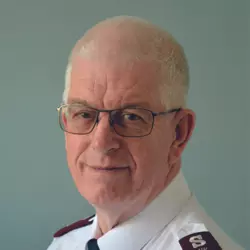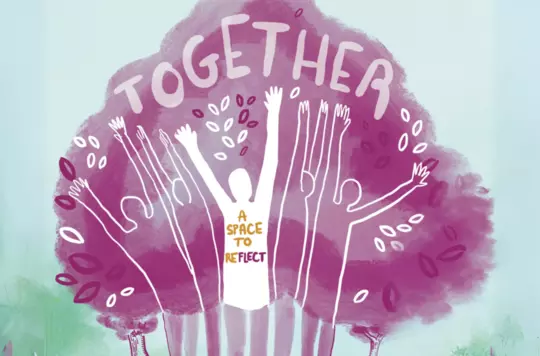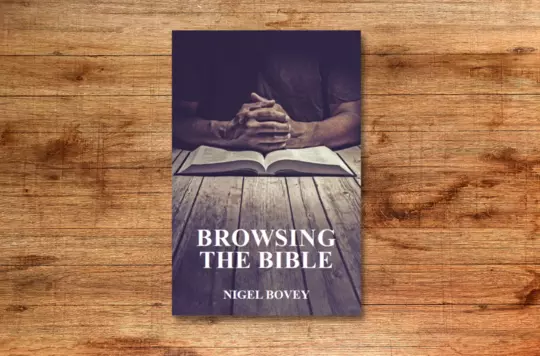24 February 2024
Compassion: Come to the well
Major Nigel Bovey
Major Nigel Bovey suggests that our mess can become our message.
Key text
How does boy meet girl? For today’s phone-carrying generation, they might swipe right for a date. In biblical times, boy might have met girl among the palms, under the dates or at a well. The meeting of Jesus and the Samaritan woman at the well in Sychar is a significant encounter, where social and cultural prejudices are challenged and broken down.
In his story so far, Jesus has attended the Passover in Jerusalem. He has protested at Temple racketeering by overturning the moneychangers’ tables. The authorities have challenged his authority to do so. People have seen his miraculous signs and believed in him (see John 2:13–23). The Pharisees have heard that Jesus is more popular than John.
Jesus decides it’s time to leave, and verse 4 of our study passage says ‘he had to go through Samaria’. Why ‘had to’? There are three major routes from Jerusalem to the northern region of Galilee. At about 120 miles, the coastal road is the longest. The Jordan Valley route is roughly 100 miles long. The shortest – 85 miles – is the mountain route that cuts through Samaria. If Jesus is escaping the unwanted attention of the Pharisees, it is the ideal route, as Samaria is a no-go area for devout Jews.
In her story so far, the Samaritan woman – ‘St Photini’ in Orthodox and Catholic traditions – has been brought up facing prejudice. Once the centre of the northern kingdom of Israel, Samaria was invaded by Assyria in 722BC, bringing foreign settlers and gods. When, following Judah’s return from Babylonian exile, Samaritans offered to help rebuild the Temple, they were soundly rebuffed (see Ezra 4:1–3). Consequently, Samaritans built their own temple on Mount Gerizim and restricted their Scriptures to the five books of Moses – the Pentateuch.
Verse 9 of our study passage records that ‘Jews do not associate with Samaritans’. The feeling is mutual.
Pause and reflect
- What prejudices do we have that distance us from certain people?
Jesus is tired from his journey. This is an understatement. Jerusalem to Sychar is about 44 miles, with a climb and descent of 9,000 feet. This is likely his third day of walking. He arrives at noon, having probably walked for at least five hours. It is April – all three Passovers in John’s Gospel were in April – so the temperature is above 20C.
Jesus is hot, sweaty, smelly, aching and desperate for water. He is apparently disorganised enough to have forgotten to bring a cup. The Messiah is likely a mess.
He asks the woman for a drink. What does she see? A thirsty traveller? A struggling stranger? No. She has come to draw water, but instead draws on 700 years of suspicion and misunderstanding: ‘You are a Jew and I am a Samaritan woman. How can you ask me for a drink?’ (v9).
Without thinking, the woman follows cultural prejudice and not her compassion. She does not see a person; she sees a problem.
Pause and reflect
- Would we rather welcome people from other corps into our halls or people off the streets?
- What does Jesus see? After a discussion about types of water, Jesus asks her to call her husband.
The conversation now centres on the woman’s relationships with men. With five husbands, and now living with a man who is not her husband, Jesus sees a woman whose life is messy.
Based on the absence of other women, the inhospitality of the noonday sun and her personal history, some preachers and commentators deduce that this woman is even a prostitute. This is inference without evidence. Note that Jesus does not tell her that she has sinned, as he did to the woman caught in adultery in John 8:11.
Under the prevailing culture, the concept of a single, independent woman did not exist. A woman was always cared for by a man. Under the Mosaic Law that Samaritans observed, only a man could divorce. There are, therefore, only two ways that this woman could have lost husbands – through death or divorce. Here is a woman who has been left and bereft time and again. She is likely someone whose dreams, schemes and heart have been broken.
Pause and reflect
- How often do we judge people who have been through numerous relationships?
Jesus is not put off. He addresses her deepest needs. He offers ‘a spring of water welling up to eternal life’ (v14). He redirects her from the security of long-held prejudices and explains the nature and inclusivity of true worship. He reveals himself to her as the Messiah.
She heads back into town, recounts her conversation and asks: ‘Could this be the Messiah?’ (v29).
Her in-depth encounter with Jesus has turned her into an evangelist. Were she the woman of ill repute, as she is often portrayed, would people have taken notice of her? Because of her testimony, many Samaritans ‘believed in him’ (v39). Jesus stays and ‘many more became believers’ (v41).
Through Jesus’ compassion, the woman’s mess becomes her message of redemption. Her heartbreak becomes the means by which other people give their hearts to the Lord.
We do not have to be perfect, pretend or prove anything to God. He knows, welcomes and values us. He uses us not despite our mess but because of our mess. If the woman at the well had been a well woman, fewer people would now be in the Kingdom of Heaven.
Bible study by

Major Nigel Bovey
Retired Officer, Exmouth
Discover more

A weekend for all ages to explore belonging, discipleship and membership within the Kingdom of God and The Salvation Army UK and Ireland Territory.

Human Resources Director Alex O’Hara talks to Major Julian Watchorn about how the Army’s values shape its policies.

Dr Claire Luscombe and Dawn Richardson share the positive impact of trauma-informed care with Stevie Hope.

Emily Bright interviews Major Nigel Bovey about the books he's written and the books he loves.
